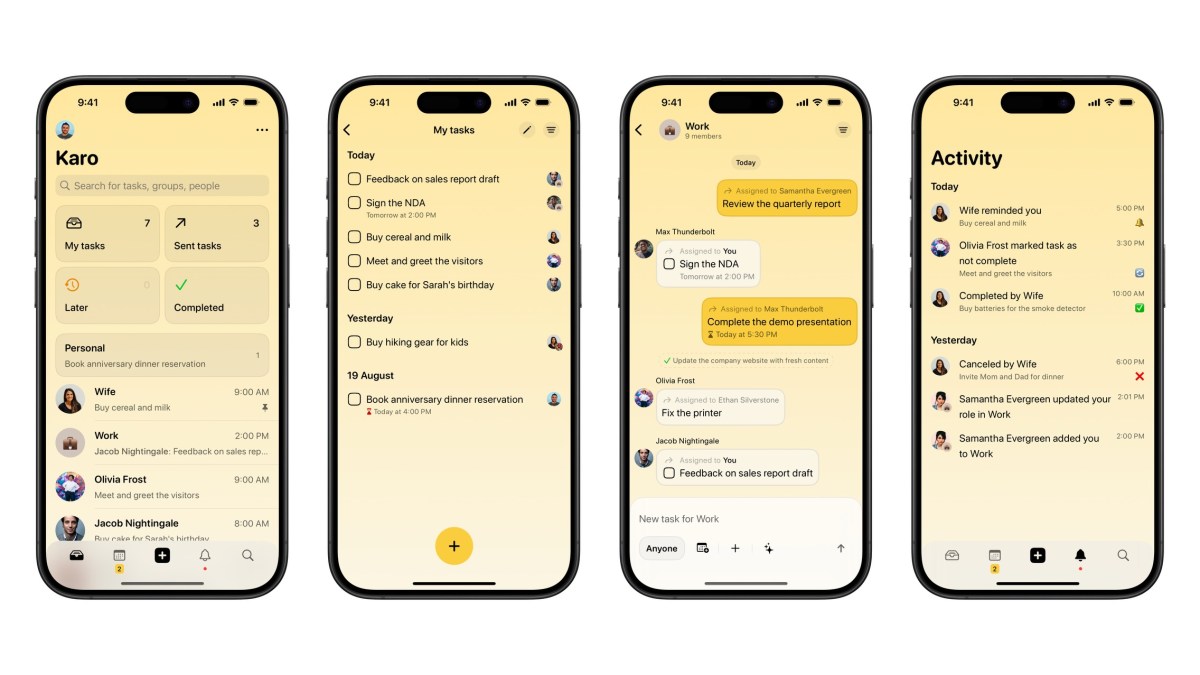You can build a reminder and task management system for yourself, and use a service that works for your team. But it might not be easy to get your family members or friends to use the same task management app. iOS app Karo (which means “do it” in Hindi) aims to solve the problem even if the other person doesn’t use the app.
This isn’t Mustafa Yusuf‘s first task management product. The India-based developer also develops another to-do app called Tasks, for more complex task management. Yusuf told TechCrunch that he developed Karo because other apps didn’t allow him the flexibility of assigning tasks to people in your address book.
“No app allowed me to simply delegate and track tasks I had for people in my contacts. For example, my accountant, sister, plumber, or electrician. I just want to send them a task, have them receive it on the apps they already use (WhatsApp/Messages), and get notified when they act on it. If they don’t, instead of me nagging them, I’d prefer the app to send automatic reminders,” he said.
Yusuf said that prior to creating the app, he had to manually remind them through WhatsApp or other chat apps to complete a task. Plus, because there was no tracking system, even he forgot tasks.

The app and the features
Karo lets you input tasks easily in an interface that looks like a conversation in a messaging app. You can use natural language to add tasks as the app recognizes identifiers, such as “tomorrow” and “10 am.” It then automatically creates a task with a deadline if you mention a specific time and date. Plus, you can @mention a particular person to assign a task to them. Alternatively, there are buttons for adding date, time, and a contact to a task as well.
Users can optionally attach an image, a video, a PDF document or a voice note to a task. And because it’s 2024, there’s an AI angle too. Users can invoke Karo AI to break down larger tasks into smaller tasks. They can also ask AI to help them plan a trip and list to-dos.
Once you assign a task to someone, they get a notification on Karo if they have the app. Otherwise, the app first sends them a chat on WhatsApp, and if that fails, a reminder via text message. For scheduled tasks, the person gets a reminder when the task is due as well as two and four days after the due date. For non-scheduled tasks the app sends a reminder two, four, and six days after the task has been created.
On the main screen, tasks are sorted by contact. If you tap on someone’s name, it opens up a conversation interface with them where you can see past tasks and add more tasks. The app also has an activity tab where you can see updates about all tasks that you are involved in.
While teams and small organizations might use dedicated solutions for task management, in a country like India, a lot of businesses don’t have a proper system in place. They prefer to handle tasks in WhatsApp groups directly. Yusuf thinks Karo’s integration with the platform and its ability to create groups within the app will appeal to WhatsApp users.
He mentioned that some firms are already using the app for their work. For instance, a dry fruit distributor in Mumbai uses Karo to assign packaging and delivery tasks to their team. Folks on the team check off tasks through WhatsApp. Yusuf added that this could be useful for study groups or book clubs.
Karo is available for free, but you have to pay if you want to use features like groups, themes, and attachments. The app is originally priced at $4.99 per month, $39.99 per year, and $99.99 for lifetime unlock with introductory launch offers on all plans.
Yusuf is planning to make an Android version available to users soon. But he thinks that even if people don’t use the app, the ability to send your contacts a reminder without them being on the app is the main draw.
#Karo #todo #app #lets #assign #tasks #friends #family
